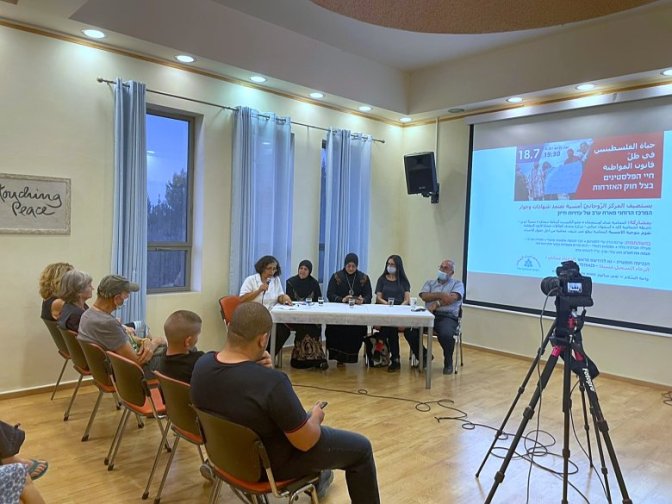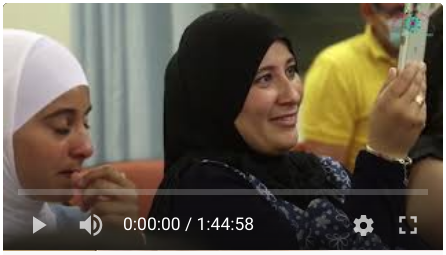Home > Oasis of Peace > Projects & Outreach > Doumia-Sakinah: The Pluralistic Spiritual Centre > The Life of Palestinians in the Shadow of the Citizenship Law
The Life of Palestinians in the Shadow of the Citizenship Law
Sunday 25 July 2021
All the versions of this article: [عربي] [English] [עברית]

On Sunday, 18.7.2021 at 19:30, an evening of testimony and discussion was held at the Spiritual Center with the participation of:
• Adv. Adi Lustigman
• MK Osama Saadi
• Sumiyah Abu Zar - Social activist from Lod
• Asmahan Jabali, coordinator of the Forum for Families Harmed by the Citizenship Law.
The program was moderated by attorney Neta Amar-Schiff, advocate for Human Rights.
It was a moving and exciting evening. The Arab and Jewish audience came from the village and outside of it.
MK Osama Saadi, a Knesset member from the Joint List, opened the evening with a description of the parliamentary struggle to rescind the law, rather than extend it. He told of the multi-year struggle against the law, and claimed that although it was supposedly enacted for security purposes, it is actually intended to preserve the Jewish majority in the country. Its aim is to coerce Palestinian Israeli citizens who marry Palestinians who are not Israeli citizens, to leave Israel. According to Saadi, there are about 150,000 citizens who have been directly harmed by the law. The State of Israel deprives them of citizenship, treats them harshly, and requires them to submit requests for family unification through formalization of the spouse’s and children’s status, either as temporary residents, permanent residents or as citizens. However, the vast majority of these requests never receive a response.
MK Saadi was followed by two Palestinian women, Asmahan Jabali and Somaria Abu Zar, who shared their personal stories with the audience. These can be heard in the video recording of the evening. Their stories evoked amazed reactions from the audience, who responded with questions and requests for further elucidation.
Some of the women’s family members also attended the evening. Their testimony was added to by Wael, a Jerusalem man who had married a Palestinian woman. Their children, after long years, are still not included in the Civil Registry, so they are ineligible to receive identity cards or basic rights. Wael had heard about the evening through Facebook and came to tell his story.
The final speaker, Adi Lustigman, a lawyer and WASNS member, spoke of what the future may hold for these families, and what options may be amenable to Palestinians who have fallen victim to this racist law. Will the Israeli government succeed in passing the law? Will the fact that the law is repealed allow families to be more successful in appealing to the courts?
The evening was well and sensitively moderated by Neta Amar-Schiff, a human rights lawyer and member of the village. Following the program, there was a lively interaction between the audience and the speakers, and the participants remained to chat for another hour.
Video (Hebrew and Arabic) on YouTube:

Photo Album
